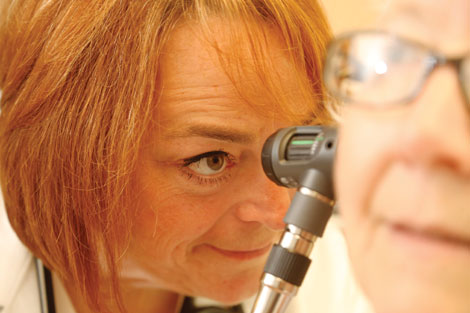One of the challenges we may face as we get older is the development of hearing loss. One in three people over the age of 60, and half of the population over the age of 80, have some degree of hearing loss.
It may surprise you that hearing loss is not a condition reserved for the elderly, though. Half of all people with hearing loss are under the age of 60, and a growing number of youth are being diagnosed with hearing loss.
Newborns are screened for hearing loss before they leave the hospital. Approximately two babies per 1,000 are diagnosed with hearing loss. That’s more than 3,000 babies each year in Washington alone.
Why is this so important?
Hearing loss can affect all aspects of our lives: communication, learning, social interactions and even emotional health.
Hearing loss is communication loss. Communication loss occurs when people cannot exchange their thoughts and ideas effectively. When communication is difficult, relationships can suffer. When relationships suffer, people can feel isolated from one another.
Hearing loss is a family matter because it affects everyone in the family.
Communication loss can be fatiguing. It takes extra effort to make sure your listener understands you. It can also be exhausting for the listener to try to figure out what you mean, too. This can sometimes cause communication to be limited to “just the facts, ma’am.â€
When there is less communication about feelings, hopes, fears and dreams, or reflecting on an event, something important is lost.
Treating hearing and communication loss
One of the keys to maintaining good communication is to identify hearing loss when it exists. An audiologist can evaluate your hearing and explain the results for you. An ear, nose and throat physician can determine if medical intervention is possible.
Some conditions that cause hearing loss do respond to medical treatment. Other conditions, such as hearing loss associated with age, generally are not medically treatable. When the hearing loss will not respond to medical intervention, your audiologist can provide treatment with hearing aids and/or other assistive listening devices.
It’s important to treat hearing loss as soon as it is identified. A baby diagnosed in the first weeks of life should receive hearing aids as soon as possible, and well before the first birthday. We don’t want that little one to miss out on anything.
It is important for adults to receive help as soon as possible, too. Sometimes adults delay getting hearing aids due to concerns about how others will perceive them. However, untreated hearing loss shows much more than any hearing device.
Tips for communicating
Use of good communication strategies can also go a long way toward maintaining good relationships among family members. If you are a communication partner for someone with hearing loss, consider using the following tips:
• Say the name of the person you wish to speak to, in order to get his/her attention.
• Maintain eye contact. Face-to-face communication adds information such as facial expressions, gestures and body language that help clarify what the speaker is saying.
• If your listener appears to have difficulty understanding, try to rephrase what you are saying. Misunderstood: “Your doctor appointment is next Friday.†Understood: “You have an appointment with the doctor next week. It’s on Friday.â€
• An effective way to ensure that a message was understood is to have the listener repeat or verify what he/she heard: “The phone number is ….â€
• Choose quiet environments when you want to have meaningful discussions. Noisy environments are challenging for everyone. This is especially true for people with hearing loss.
• Pay attention to how well your family member with hearing loss interacts with others when you are gathered in group situations. Too many people speaking at once can be overwhelming and frustrating. Ask people to take turns speaking so that everyone can hear each other better.
Communication partners play an important role in providing support to their family members with hearing loss. Good communication is a family matter.
Dr. Joni Johnson, who wrote this article,

is a board-certified audiologist specializing in pediatric and educational audiology. Johnson is particularly interested in helping families who have a member with hearing loss develop healthy communication partnerships. She practices at MultiCare Gig Harbor – ENT Specialists.